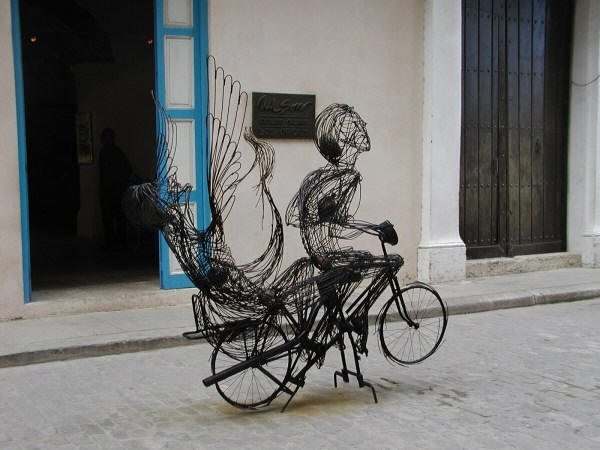
Wire Sculpture, Havana Art Gallery

These are some notes on my visit to Cuba from November, 2000 to January,
2001. Some things in Cuba are very similar to the US, but many others
are very, very different.
This essay doesn't pretend to be a full-scale analysis of Cuba. That would be beyond its scope. These are my own observations, reflections and comments on things I myself personally saw, heard and did. Before and after visiting Cuba, I spent some time visiting Mexico, to get some perspective and to make a few comparisons. I hope you'll find it useful.
On the final page of this essay, you'll see links to some other pictures I took, and a page of references for useful English-language sources on Cuba so you can research Cuba further on your own.
WHY CUBA? WHY ME?
My interest in Cuba has deep family roots. My father and his parents lived there from 1939 to 1942. As Jewish refugees from Nazi Germany, they were unable to enter either Great Britain or the United States, despite having close relatives in each. The Roosevelt administration strictly enforced a restrictive quota on Jewish immigration. My father and his parents had to wait in Cuba until 1943 before obtaining permission to enter the US. I was born in New York City in 1944. (A good history of the Jewish experience in Cuba is Robert M. Levine's 1993 Tropical Diaspora (ISBN:0-8130-1218-X). There's also a novel which eloquently evokes the time when my father lived in Cuba, Passing Through Havana, by Felicia Rosshandler (ISBN: 0-312-59779-7).
My father took me to Cuba in August, 1956. We visited his old residence and met some of his old friends. I don't remember much about it except that Cuba was a very hot and sticky place. (I was only 12 at the time.) We stayed briefly at the Hotel Nacional, and after that we moved to a smaller hotel. We traveled to Pinar del Rio with one old friend, John Gundrum, also a German immigrant, but one who'd never left Cuba.
In November, 2000 I made my second visit to Cuba as an adult. I'd spent three weeks there in late 1999, on a delegation of yoga teachers and students meeting and practicing with our Cuban counterparts. I knew more than most in the US about this Caribbean nation. I've read a lot of Cuban history, and followed Cuban affairs closely. Now I wanted to take a much closer look.
How do Cubans actually live, day-to-day? I wanted to get a sense of how they work, their likes, dislikes and so on. It's one thing to hear and read about a place, in the media (Cuba is terrible place! People are dying to leave!) or, on the other hand, uncritically favorable accounts among the few left media sympathetic to Cuba.
My Spanish is limited, so I often had to depend on bilingual friends and acquaintances for answers and directions. During my 31-year career as a social worker for Los Angeles County, I learned some simple "street Spanish," but not enough to carry on a complex conversation. I met many who speak, and wanted to practice, English, so I was able to get answers to my many questions.
Staying in Cuba for two months, I noticed the lack of things someone living in the US might take for granted, and I've listed some of them on these pages, although every traveler will come up with his or her own list. For example: |
In Havana I stayed with a Cuban family I'd met in 1999. One family member had recently quit the public sector job he'd had for 13 years, and entered self-employment. He translates Cuban TV scripts from Spanish into English as an independent contractor. Cuba hopes to sell these to providers like the Discovery Channel. He also translates for visiting journalists and filmmakers. Weeks before my arrival he'd worked with Academy Award-winning documentary filmmaker Barbara Kopple, filming the Washington, D.C. ballet's visit to the country. His mother is an engineer working for a government ministry. She belongs to the Cuban Communist Party. I didn't pay rent, but bought the food and other items for the family. I often shopped and sometimes cooked for the family. I don't think they've eaten so much garlic in their lives! (Fortunately, they like garlic...)
CUBA'S HISTORIC GOALS:
INDEPENDENCE AND A JUST SOCIETY
Essential to understanding today's Cuba is the bitter history of US-Cuban relations. The two nations have had a long, close and tense connection. Nineteenth century US politicians discussed annexing the island. They tried to derail its independence, or thwart its efforts to forge a just society where the interests of Cubans was put first. Even now, most US politicians still act and speak as if they have the right to tell Cubans how to run Cuba. The revolution led by Fidel Castro and his compañeros is the most successful of Cuba's efforts.
Backers of the overthrown Batista dictatorship were welcomed to the US. Washington opposed Cuban efforts to take control over national resources from foreign (mostly US) companies. It has opposed, and tried to turn back, the revolution at every turn. Washington and its supporters call this policy "the embargo." Cuba calls it "the blockade." This is because Washington relentlessly tries to bulldoze all other countries into supporting its anti-Cuban activities.
SINCE THE COLLAPSE OF THE SOVIET UNION
During Cuba's alliance with the USSR and the states of Eastern Europe, the island received long-term contracts for its commodities at stable, and sometimes well-above world market prices. This provided the economic and military foundation for Cuba to survive Washington's decades-long effort to starve it out. Washington had to think twice about military intervention. The island's politics and economics were heavily influenced by the Soviet model.
Water: Don't assume that when you open the tap that water will come out. Don't take it for granted that when you open the hot water tap that hot water will come out. Very few Cubans have hot water heaters. Some have home-made systems that literally heat the water at the outlet (typically the showerhead). Often, that's the only hot running water available, and where I lived, even that only really worked while the water pressure was turned on fully. In order to have hot water for showers I quickly learned to heat water on the gas stove and then add it to cold water kept in a bucket in the bathtub. I then used the mixture to wash off. The only time I had an actual bath in Cuba was in a hotel. |
The collapse of the USSR brought drastic change. Eighty-five percent of Cuba's foreign trade had been with the Soviet bloc. The economy nearly collapsed. Friends tell me there were times when they literally went to bed hungry at night. Cubans call this the "special period in a time of peace" which isn't quite over yet. Cuba's principal trade partners now are Canada, Spain, Venezuela and Italy. Sugar has been replaced by tourism as the island's main foreign exchange source. While the government retains control over the commanding heights of the economy, Cuba's economic strategy today includes considerable openness to foreign investment. Most of this is in joint ventures with the Cuban state.
Cuba has opened up three duty-free zones which employ skilled and educated Cuban workers in commercial manufacturing, service provision and merchandising. Three hundred foreign companies are already active in these zones. Cuban workers are paid in hard currency. Tax exemptions and easy repatriation of profits make these particularly attractive to foreign corporations, and therefore these tax and duty free zones are marketed as such. Another duty free zone is set to open in Cienfuegos soon.
The fall of the Soviet bloc accelerated a reassessment of many previously held ideas. This had began somewhat earlier, during the rectification campaign following the 1986 congress of the Cuban Communist Party. There's an extensive literature in which Cuba's ties with the Soviet Union are reviewed and assessed critically. Here's a sample:
In the book Development Within Underdevelopment: New Trends in Cuban Medicine, by Ernesto Mario Bravo (Editorial Jose Marti, 1998) we read about Dr. Pedro Lopez Saura, MD, a pioneer of Cuba's biomedical industry, specifically recent work with Interferon. Here are some of his impressions of the German Democratic Republic, where he worked and studied:
The collapse of the socialist camp has affected him because of what it has meant for Cuba, but it didn't come as a surprise. After living in the German Democratic Republic for six months, he came to the conclusion that that was a case of imposed socialism. He saw the people's unhappiness and found that they were building socialism on the basis of capitalist values, attempting to turn socialism into an improved form of capitalism. He regrets what happened, because it was a step backward in history; but, in the long run, he thinks that what happened may turn out to be good because, the next time around, it will be the real thing.
He is convinced that capitalism doesn't solve man's problems. He knows this because Latin America and Africa live under capitalism. This is why he is so sure that people in Cuba will resist -- he has no doubts about it. He is convinced that scenes such as those which appeared on TV during the Gulf War, with Iraqi soldiers kissing the hands of US soldiers, will never take place in Cuba.
New Post-Soviet Thinking
Religious believers were welcomed to membership in the Cuban Communist Party in 1992, after considerable debate. (Before that, you had to be an atheist.) This broadened the party's social and political base. Religion and its role in Cuban life are discussed on television. Religious institutions have their own publications, but not their own radio or TV stations as some would like.
Alternative and traditional medical modalities are available. They're cheaper and less invasive than allopathic medicine. Acupuncture, laserpuncture, herbology, massage and even mudbaths are now part of Cuba's national health care system. I saw local traditional medicine clinics, which have expanded recently. Like all Cuban medical care, they are completely free to Cubans. They are also offered at modest prices to foreigners. A Mexican airline flight attendant and friend of my hosts dropped in for a visit one evening. Together with her mother and brother, she had brought her ten-year-old son, who has Downs Syndrome, to Cuba for an experimental treatment. Many patients come from the US for treatments which are either unavailable or more expensive at home.
Foreigners travel to Cuba to take advantage of its advanced medical technologies. This is a notable source of hard currency. Cuba is AHEAD of the United States in some areas. The use of lasers with acupuncture, developed in China, has been available in Cuba for some time. Enabling legislation for this has yet to be adopted in the US.
Smoking: In the US and other developed capitalist countries (except possibly Japan), smoking is on the decline and is socially discouraged. Cubans smoke everywhere, even on Cubana Airlines (in the rear of the plane). I was amazed at how many people smoke right in your face with no consideration for others. (Of course, I was sometimes like that when I was a smoker!) |
Yoga, too, has now been accepted. Dr. Eduardo Pimentel, the leader of Cuba's national yoga association, told me that the government is encouraging it broadly, but they lack experienced teachers and equipment. During my visit a group of US yoga teachers, including Rodney Yee, came to train Cubans. It was the second visit by US yoga teachers. Cuban yoga practitioners may be reached at http://fiy.yoganet.org/fiyregistered.html or contact the Yoga Association of Cuba, a member of the International Yoga Federation, Licenciado Eduardo Pimentel Vázquez, Presidente, La Rosa # 610 apt. 2 / entre Boyeros y Ermita, Plaza, Ciudad La Habana, 10600, Cuba, Telephone: (53-7) 709237; e-mail: epvyoga@infomed.sld.cu
MONEY MATTERS
Since the traumatic fall of the Soviet Union, people talk about money matters all the time. An underground economy, fed by US dollars, caused havoc in the currency system. Individual possession of the US dollar was legalized in 1993. The dollar then was worth up to 150 Cuban pesos. Legalizing the dollar and other stabilization measures brought the peso up to 20 to the dollar today. Cuba is one of the few Third World countries whose currency has increased in value during the past decade.
Three forms of currency are used. The Cuban peso, the US dollar, and "convertibles," which are Cuban pesos pegged 1:1 to the US dollar, and accepted everywhere there. "Convertibles" are not a "hard" currency, however.
Cuba is considering making its national currency fully convertible. They are extremely wary, however, of allowing too much dependence on the dollar. Some countries, like Ecuador, have replaced their national currencies with the US dollar. This makes them extremely vulnerable to sudden changes in the US economy. Cuba struggles to maintain as much economic independence as possible.
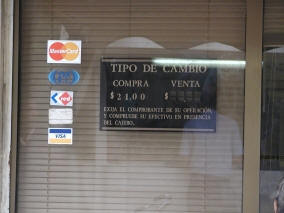 In
the past, currency-conversion was illegal. Unlicensed money-changing is
still against the law, but now anyone (Cubans and foreigners) can
exchange money in widely available licensed public offices called
Casas de Cambio (CADECAs). It's quite a sight to see these small
institutions with their MasterCard and Visa signs where people can
exchange pesos for francs, or pounds sterling, or dollars, or get a cash
advance with a credit card. (Only cards from US-based banks aren't
accepted.)
In
the past, currency-conversion was illegal. Unlicensed money-changing is
still against the law, but now anyone (Cubans and foreigners) can
exchange money in widely available licensed public offices called
Casas de Cambio (CADECAs). It's quite a sight to see these small
institutions with their MasterCard and Visa signs where people can
exchange pesos for francs, or pounds sterling, or dollars, or get a cash
advance with a credit card. (Only cards from US-based banks aren't
accepted.)
Tourism has brought hard currency, but also sharpened social stratification. Cubans who work in hotels and restaurants often receive tips in dollars. These become more economically significant than their peso-denominated salaries.
To limit competition between workers, they must share their tips with all workers in the establishments. In this way, cooks, cleaners and others without public contact share these hard currency benefits, along with waiters and bartenders. This rule, I was told, is strictly enforced by Cuban trade unions. Workers who are caught violating this rule can be fired. Since these jobs are highly coveted, these regulations are widely observed.
When journalists write that the Cuban peso is roughly exchanged at the rate of 20 to the US dollar, a misleading impression can be gained because many basic necessities are heavily subsidized, by governmental policy. Most people, like my hosts, own their own homes and pay little or no rent. This was one of the earliest gains of the revolution. I asked my hosts what their monthly utility bills were for November. They gave me their four bills for gas, electricity, telephone and water. Below you can get some idea of what they pay in Havana and what I pay in Los Angeles for the same basic necessities.
| Havana Utility Bill |
Cuban Pesos
|
US $ Equivalent
|
| GAS |
2.9 pesos
|
less than 11 cents
|
| ELECTRICITY |
16.2 pesos
|
just over 80 cents
|
| WATER |
(imagine!) 1.3 pesos
|
6 cents
|
| TELEPHONE |
8.16 pesos
|
just over 40 cents
|
| LA Utility Bill |
US Dollars
|
Cuban peso Equivalent
|
| GAS |
$40.00
|
800 pesos
|
| ELECTRICITY |
$70.00
|
1400 pesos
|
| WATER |
$25.00
|
500 pesos
|
| TELEPHONE |
$30.00
|
600 pesos
|
| Most Cubans don't use... | ||
| FAX LINE |
$20.00
|
400 pesos
|
| LONG-DISTANCE PHONE |
$100.00
|
2,000 pesos
|
| Let's not forget: |
Cuba: Monthly cost
|
US: Monthly Cost
|
| HOUSING |
Zero! Zip! Zilch! 0 pesos
|
$1,500 or 30,000 pesos
|
| HEALTH INSURANCE |
Zero! Zip! Zilch! 0 pesos
|
$350 or 7,000 pesos
|
Traffic tickets in the US, even for parking, have become big income
sources for local government. If not paid promptly, the fines escalate
and you might not be able to re-register your car. Cuban tickets are
reminders of things to do or not do, rather than a form of taxation. And
they're much cheaper.
A neighbor driving me around got tickets for three separate offenses: parking, speeding, and wrong way on a one-way street (an empty residential one at 8 AM). These tickets were only 5 Cuban pesos (in other words, 25 US cents)! You go in and pay them in person. The speeding violation wasn't what we might think. Our driver was probably going 45 MPH on a relatively quiet street at 8 PM, with four passengers in a VW bug. (He might have been cited for having too many people in the car, which we did, but he wasn't cited for that!) Maybe Cuban police officers have quotas, too.
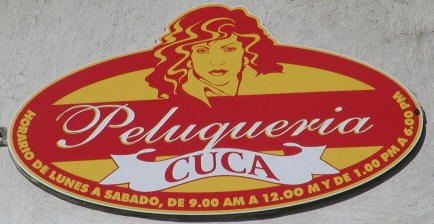 Personal care seemed incredibly cheap. Cubans (male and female) paid 5
Cuban pesos (25 US cents!!) for a haircut. This was based on 2 pesos for
the cut and a 3-peso tip to the barber. Being there for two months I
needed two haircuts and beard trims. I paid $1.00 for this (twenty Cuban
pesos) and gave the barber a $1.00 tip. He cut my beard too short the
first time, so next time I gave him $1.00 for the haircut and used his
clipper to trim the beard my self. I paid $1.00 to "rent" his clipper
for two minutes, and felt guilty about paying so little. (At home in Los
Angeles, my barber charges $10.00 at his home-based shop, located in his
garage.)
Personal care seemed incredibly cheap. Cubans (male and female) paid 5
Cuban pesos (25 US cents!!) for a haircut. This was based on 2 pesos for
the cut and a 3-peso tip to the barber. Being there for two months I
needed two haircuts and beard trims. I paid $1.00 for this (twenty Cuban
pesos) and gave the barber a $1.00 tip. He cut my beard too short the
first time, so next time I gave him $1.00 for the haircut and used his
clipper to trim the beard my self. I paid $1.00 to "rent" his clipper
for two minutes, and felt guilty about paying so little. (At home in Los
Angeles, my barber charges $10.00 at his home-based shop, located in his
garage.)
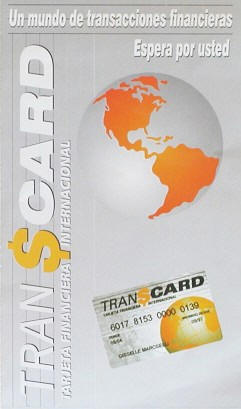 Remittances from Cubans living abroad, principally in the US, are a
major source of hard currency, estimated at $1 billion a year. This has
become easier recently via international banks in countries like Canada.
I noticed signs in the larger Havana markets offering a 10% discount to
shoppers who use TRAN$CARD, a service of a Canadian bank providing
international currency transfers.
Remittances from Cubans living abroad, principally in the US, are a
major source of hard currency, estimated at $1 billion a year. This has
become easier recently via international banks in countries like Canada.
I noticed signs in the larger Havana markets offering a 10% discount to
shoppers who use TRAN$CARD, a service of a Canadian bank providing
international currency transfers.
Cuba is similar to many other Third World countries such as El Salvador and Guatemala. where funds from family members in the US have become a significant factor in national economic life. There are complex and contradictory socio-political consequences of this.
Because the purchasing power of the US dollar is so much greater than the Cuban peso, some Cubans cynically refer to the pesos as "pre-tickets," implying that the US dollar is the actual ticket to really get into things. The purchasing power of the US dollar is far higher than that of the Cuban peso, and people act accordingly.
Making change could at times be very difficult. Registering for a Spanish course at the University of Havana, I paid with two $100.00 bills (USD). Then I needed change to buy books. The same people to whom I'd just paid my tuition said, "We're not authorized to make change." I searched all over the building until one nice administrator quietly took me aside and said warmly, "Here's your change, but please do NOT tell anyone where you got it." I promised and then got my books.
Cuba is subject to all kinds of disruptive activity aimed at its economics and politics. This includes inundating Cuba with counterfeit US bills, so special procedures are in place to cash anything over a $20.00 bill. Cashiers in stores ask for your passport (if you're a foreigner) or your ID (if you're Cuban). They note your passport or ID number, and the serial number of the bill. This was done almost everywhere.
The only exceptions were for stores or restaurants where I knew the owner personally, and in one notable case, at an upscale market in Miramar called Le Select, a place frequented by diplomats. (They must figure if you're a foreigner or a diplomat, and you shop there, you're not likely to be passing counterfeit money, and you'd be annoyed to be asked for ID.
There were very unusual (for Cuba) items are available, like trail mix, four different kinds of German sausage, and many unusual liquors. I noted a full hindquarter of lamb on sale there for $204.00 USD. However, prices for familiar Cuban products, such as Crystal beer and Cubita coffee were identical to the stores where "regular" Cubans shop.
Waiting in Line: Lines at the market, at the movies, at the bank and waiting for the bus. Lines are a constant feature of Cuban life. The Spanish word for "line" is "la cola" and the word for "last" is "la ultima," as in "Who's last in line?" There was one truly striking thing I experienced several times. Suppose people were lined up, waiting for a bus. It came and filled up. But some couldn't get on and they had to wait for the next bus. The line would break up and people would stand or sit wherever. When the next bus came along a bit later, people quietly resumed their previous place in line. |
At times I felt that workers who deal with the public should have to watch the movie "Muerto de un Burocrata" ("Death of a Bureaucrat") at least once a year. This famous Cuban comedy shows how crazy things can get when rules are inflexibly enforced. Such experiences could be extremely frustrating. Yet on many other occasions people went out of their way to be helpful and to explain how to get around such bureaucratic hassles.
SUPPLEMENTING INCOMES INDIVIDUALLY
Last year I saw a few people begging. I was told these people were mentally ill. This year there seemed a few more. It was still a handful, far less than in the US, but those I saw were men missing one or both legs. They sat on the ground or stood on crutches, with a forlorn expression, holding a cardboard box in which passersby were meant to throw coins. They also were clutching small hand-made figurines of men with missing limbs holding crucifixes. This seemed very strange, because Cuba makes its own prostheses and trains people in their use, and there are organizations that work on the rights of the disabled, the blind, the deaf and so on.
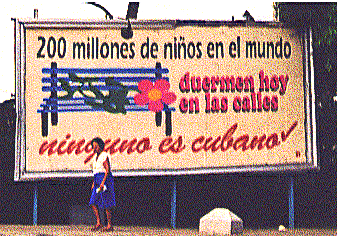 Cuban Vice-President Carlos Lage told a 1997 UN conference, " Two
hundred million children sleep in the streets in the world today. None
of them is Cuban." Lage's comment was posted on Cuban billboards. This
was the Cuban reality that I saw. Yet, there are some adults who seemed
homeless. Interestingly, all of these adults out panhandling on the
streets were white.
Cuban Vice-President Carlos Lage told a 1997 UN conference, " Two
hundred million children sleep in the streets in the world today. None
of them is Cuban." Lage's comment was posted on Cuban billboards. This
was the Cuban reality that I saw. Yet, there are some adults who seemed
homeless. Interestingly, all of these adults out panhandling on the
streets were white.
Some older people, on Cuba's
very small pensions (as little as 150 pesos per month), earn money
hawking newspapers, like Granma, Juventude Rebelde and
Trabajadores. They buy papers at their cover price (20 centavos) and
sell them to the public for 1 peso each. People understand they are
helping their less fortunate neighbors this way.
| © 2001 by Walter Lippmann and NY Transfer News. Non-profit reprints permitted with credit. |